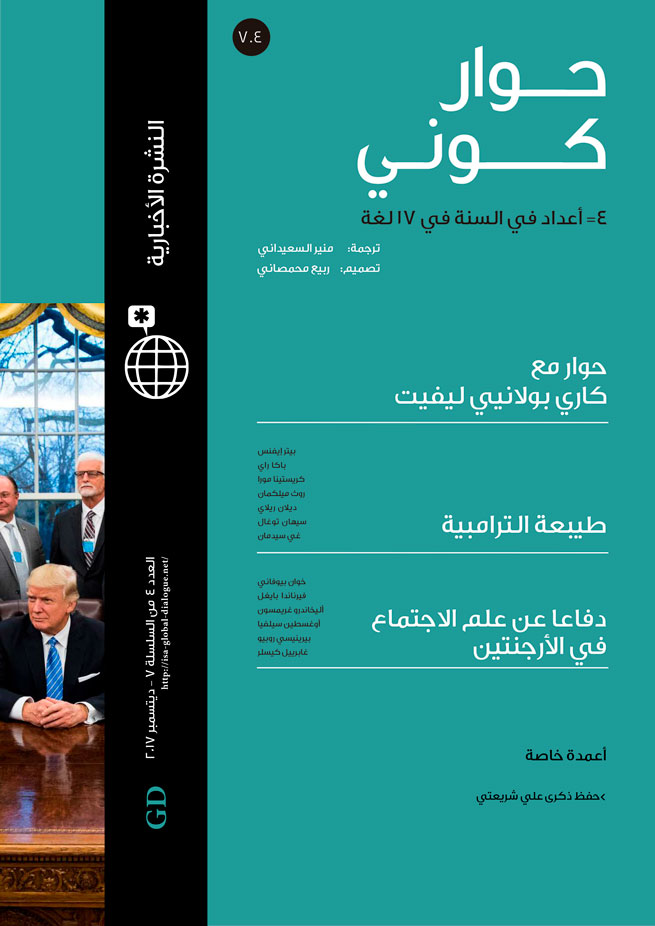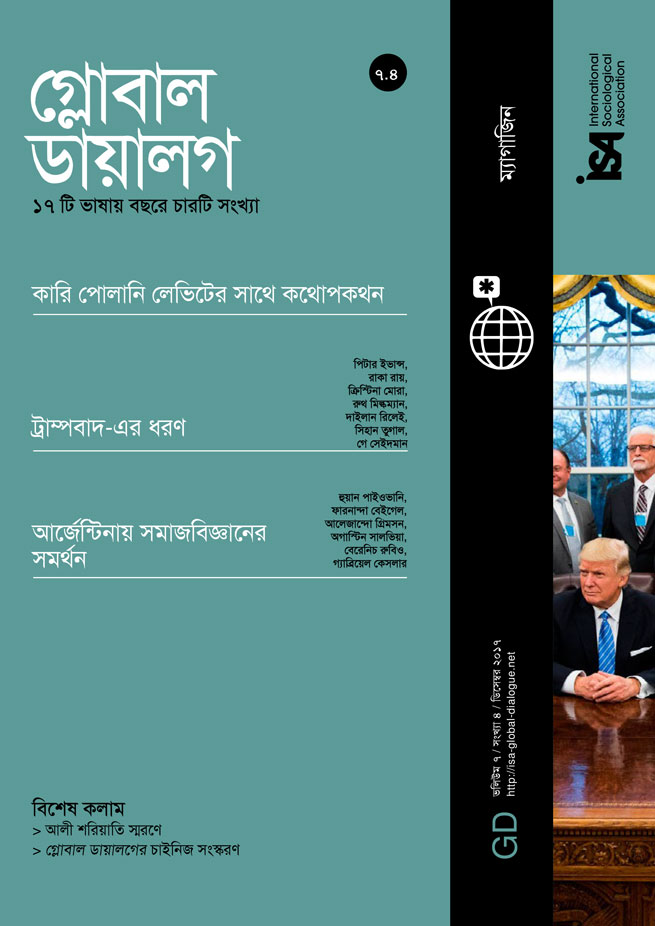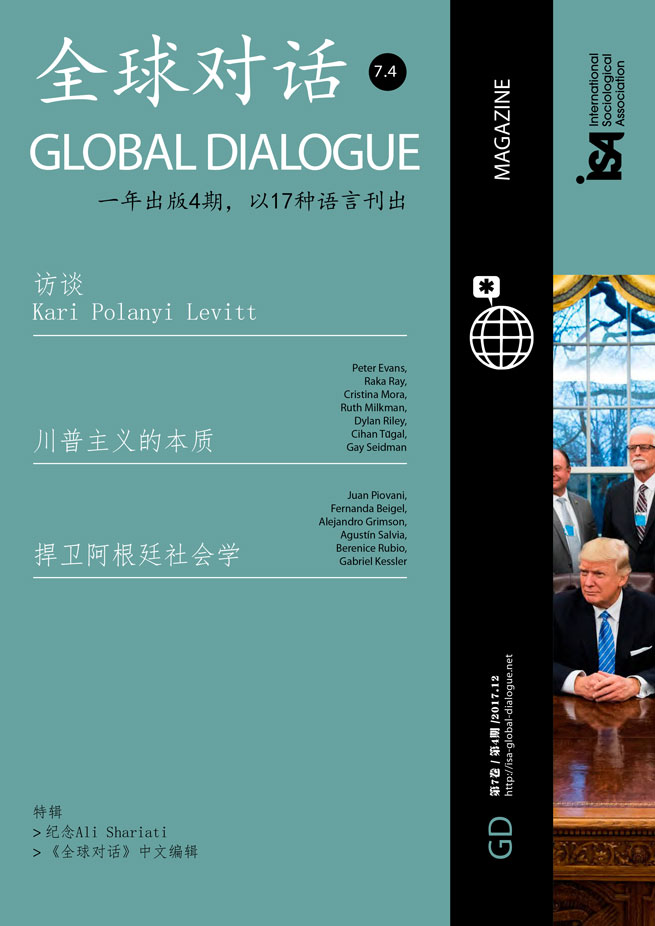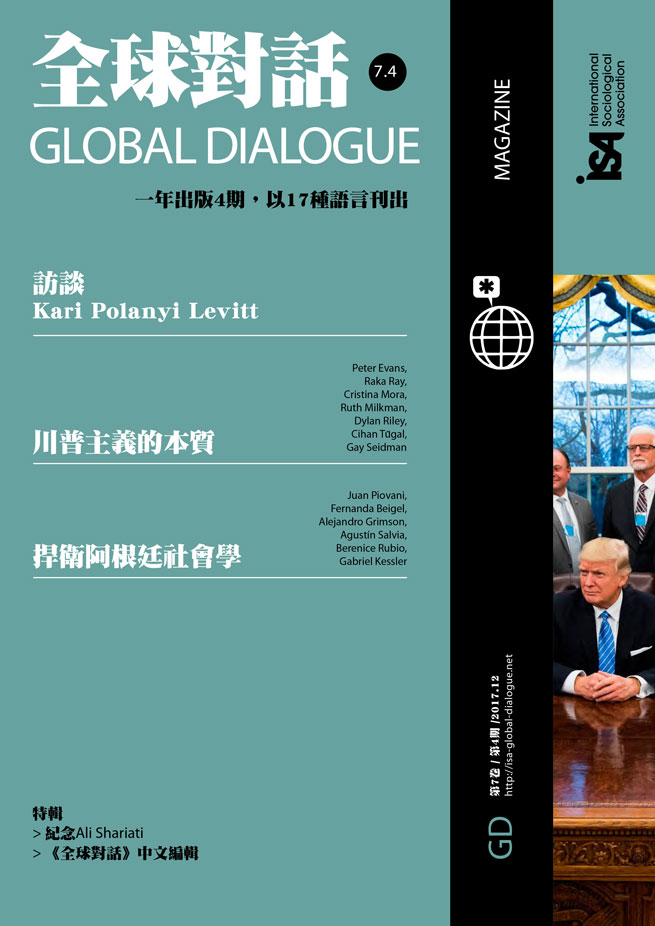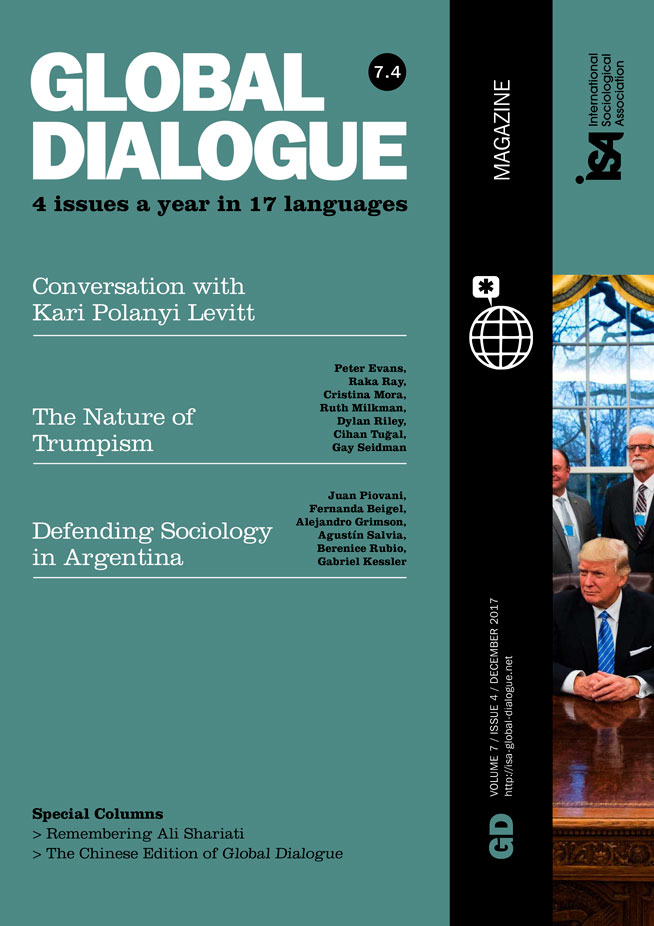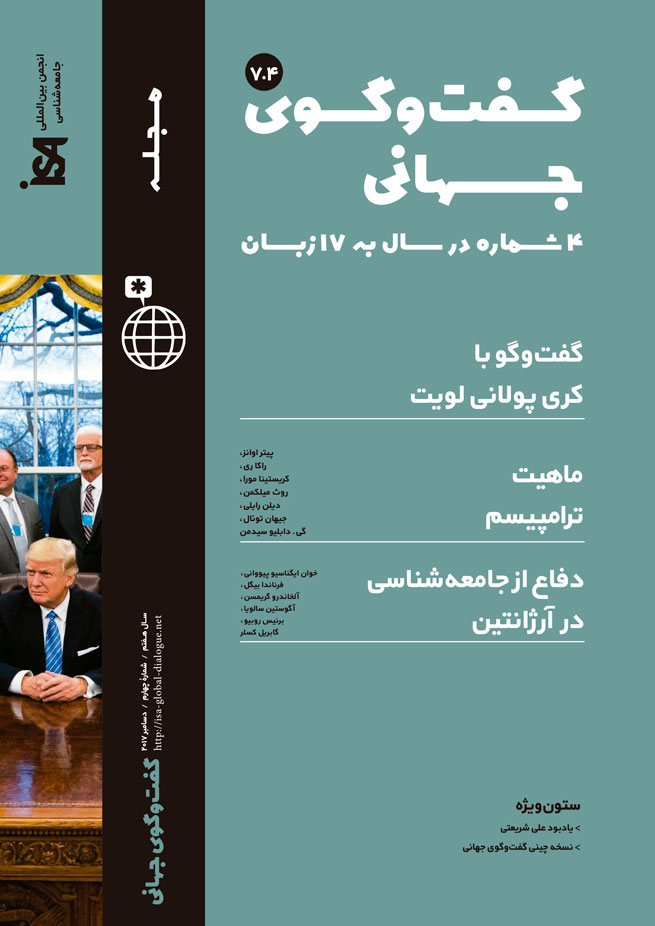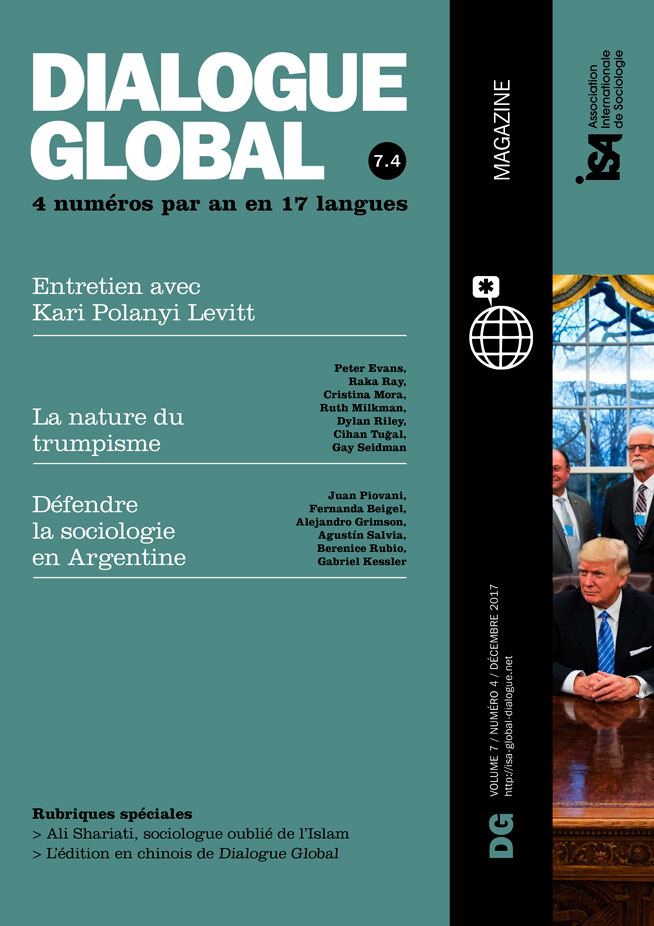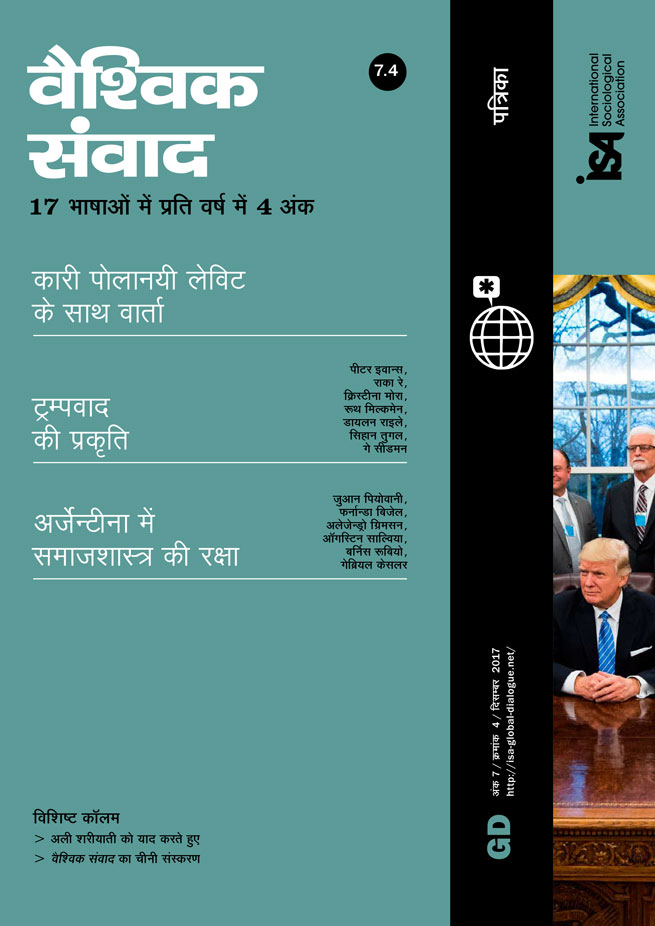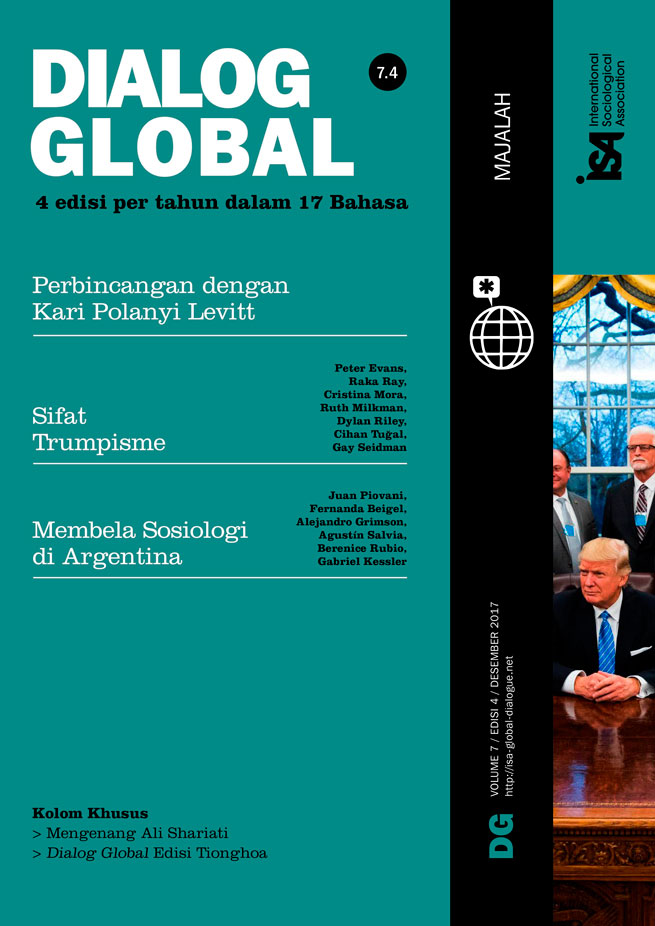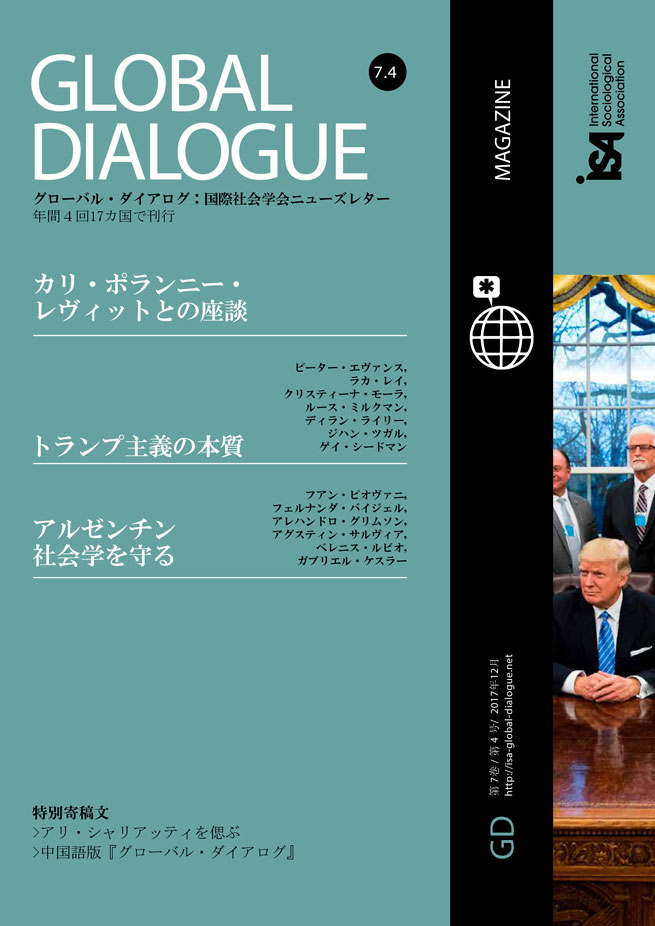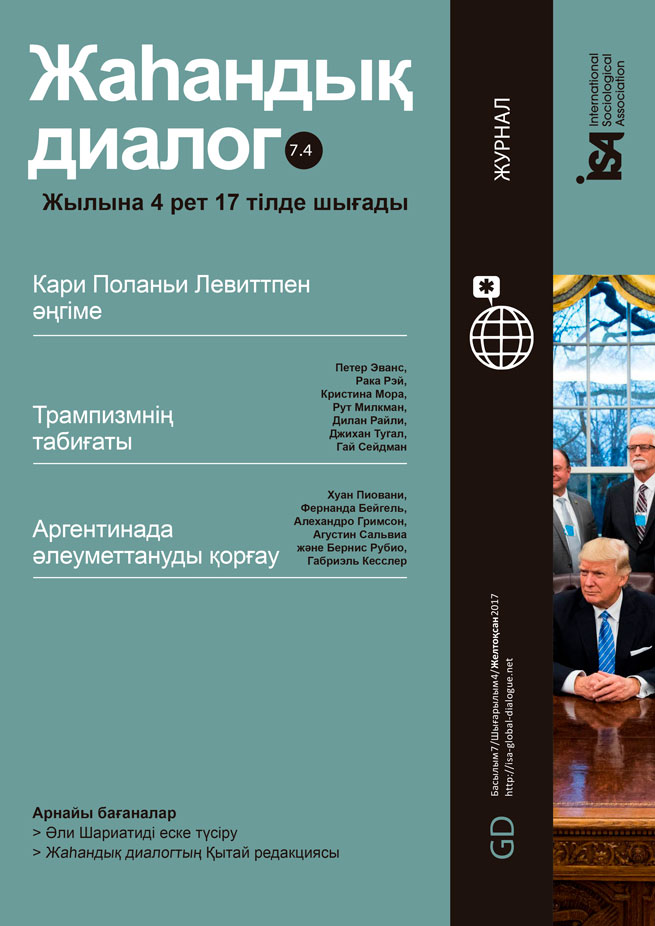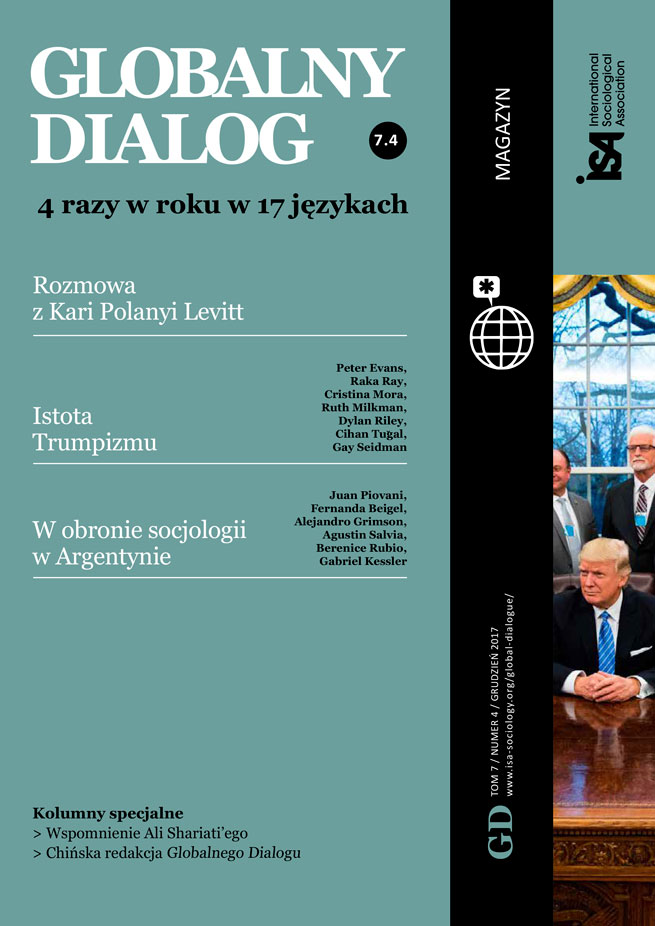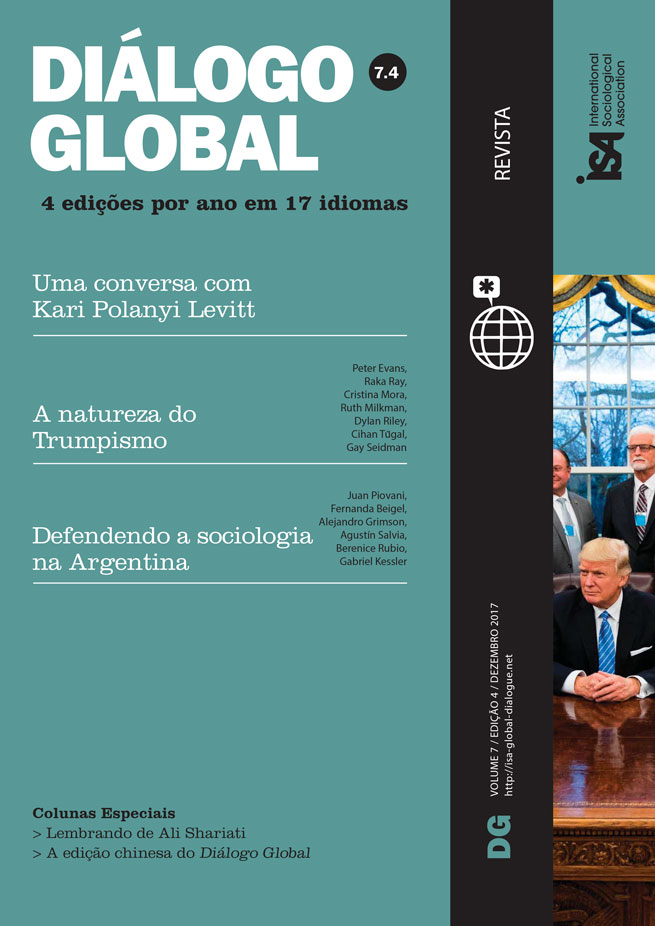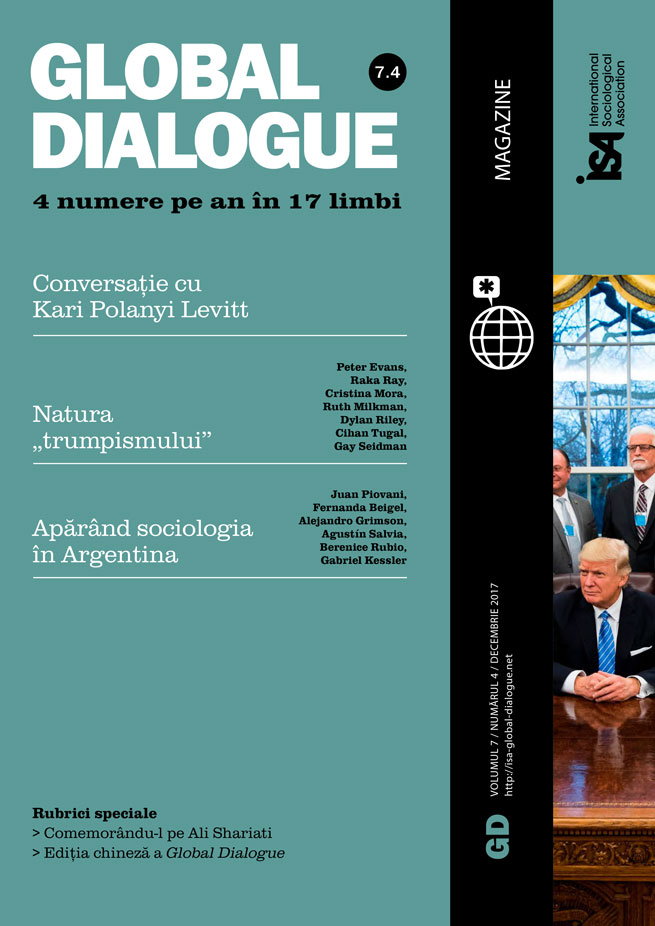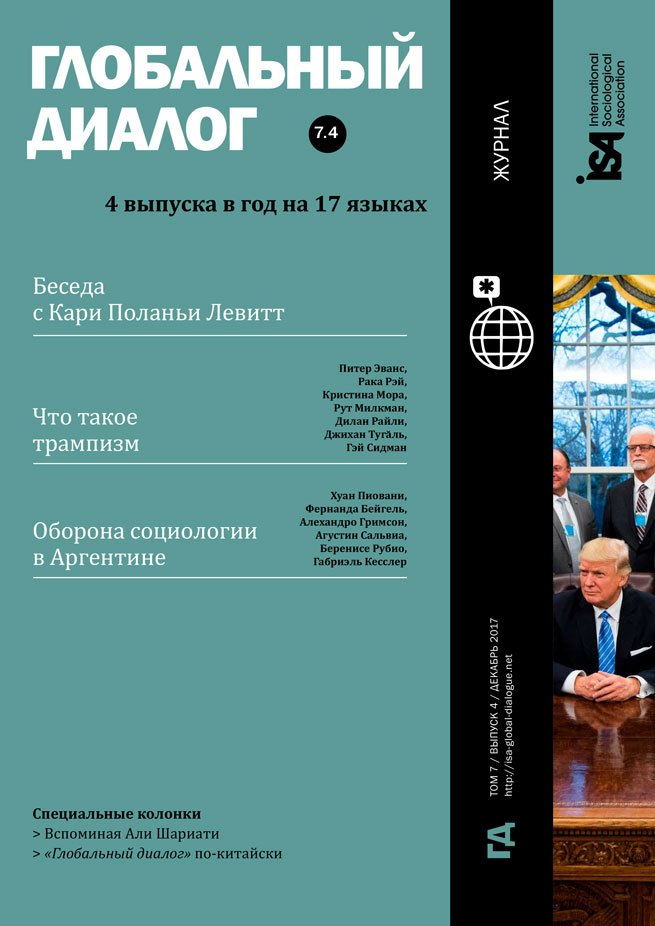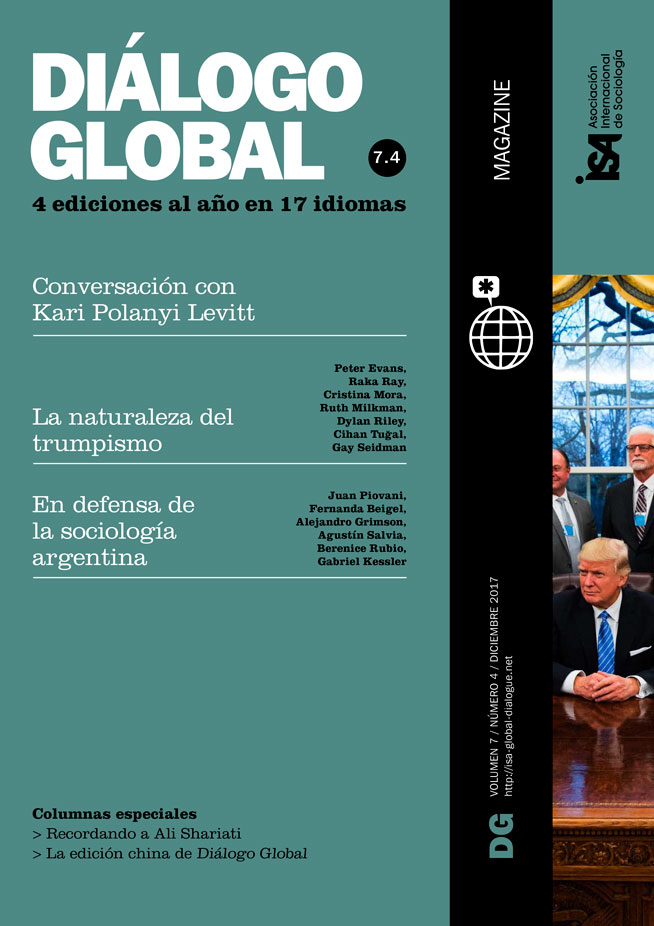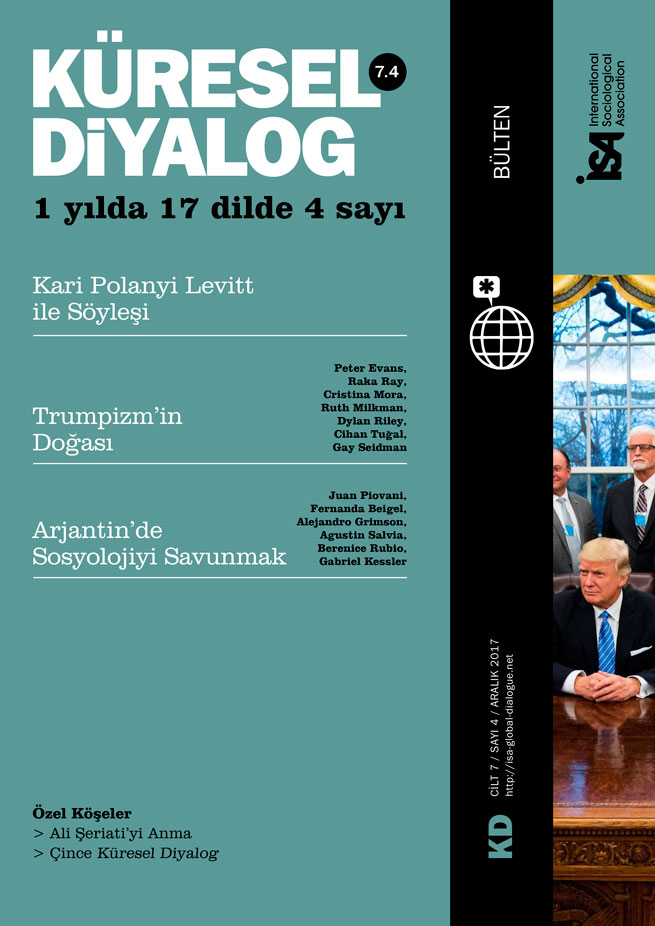Shaping The Great Transformation: A Conversation with Kari Polanyi Levitt

October 28, 2017
Karl Polanyi has become a canonical thinker in sociology and beyond. His book The Great Transformation, has become a classic that touches on almost every subfield of sociology. Its influence extends far beyond sociology to economics, political science, geography and anthropology. Being a critique of the market economy for the way it destroys the fabric of society, it has gained ever more followers over the last four decades of neoliberal thought and practice. The book is simultaneously an investigation of the sources and consequences of commodification and an account of counter-movements against commodification – movements that gave rise to fascism and Stalinism as well as social democracy. Hence it has obvious relevance to our present global context. Karl Polanyi lived from 1886 to 1964.
In this interview with his daughter Kari Polanyi Levitt, she describes the life of her father, and the influences leading to The Great Transformation. She also points to the special relation her father had with her mother, Ilona Duczynska, herself a lifelong political activist and intellectual. Here Kari Polanyi Levitt traces the four phases of Karl Polanyi’s life: the Hungarian phase, the Austrian phase, the English phase and then the North American phase. Dr. Levitt is an economist in her own right, living in Montreal, author of numerous publications, including From the Great Transformation to the Great Financialization (2013), and the edited collection The Life and Work of Karl Polanyi (1990).
The following interview is a shortened version of a public conversation she had with Michael Burawoy at the end of the Karl Polanyi conference – one of many around the world – organized by Brigitte Aulenbacher and her collaborators at the Johannes Kepler University in Linz (Austria), January 10-13, 2017.
MB: Let’s start at the beginning. We are used to thinking of Karl Polanyi as Hungarian, but he was actually born in Vienna, right?
KPL: Yes, that’s right. Interestingly, my father and I were both born in Vienna and my mother was born in a small town not far from Vienna – which of course was the great center of intellectual life, the great metropolis of the Austro-Hungarian Empire. The family, that is the mother and father of Karl Polanyi, started in Vienna. Karl’s mother, Cecilia Wohl, was sent by her father from Vilna, then in Russia, to Vienna to learn a trade. As a result of her education she spoke Russian and German. She met Karl’s father, a young Hungarian Jewish engineer – Mihaly Pollacsek – in Vienna. He spoke Hungarian and German. So the family started as a German-speaking family. And, not that long ago, I learned from correspondence that my father never learned Hungarian until he entered the Gymnasium in Budapest. My father’s Hungarian period, which is of course very important, was also shaped by a Russian influence – that came politically through Russian socialists, very different from the social democrats of that time. It was a socialism more oriented toward the countryside, the peasantry. It had anarchist elements. Communes, of course, were very much part of that political formation. And I would have to say that this Russian influence was balanced on his father’s side, who was an anglophile. And if there were two important literary figures in the life of my father it was Shakespeare – he took a volume of his collected English writings with him to the war – and, of all the great Russian writers, I would say Dostoyevsky.
MB: And then there was the influence of Russian émigré revolutionaries, among them a man called Klatchko.
KPL: Yes, Samuel Klatchko was an extraordinary figure. He lived in Vienna. He was the unofficial emissary connecting Russian revolutionaries with international and European ones. He came from a Jewish family in Vilna and spent his youth in a Russian commune in Kansas. The commune didn’t last very long. It eventually broke up, and they say that he drove 3,000 cattle to Chicago and after that he visited the International Ladies Garment Workers Union in New York. He was an activist. The Kansas commune was named after a Russian figure called Nikolai Tchaikovsky. But when Klatchko came to Vienna he formed a close friendship with the Pollacsek family and he looked after Russian folks who came to buy Marxist literature, or whatever they came to Vienna for. And my father told me – which I have never forgotten – that these men made a huge impression on him, and also on his cousin Irvin Szabo who played an important part in Hungarian intellectual life; he was also a kind of anarchist socialist. Some of them didn’t have shoes and they had their feet tied up in newspapers. My father was immensely impressed by the heroism and the courage of these people. And altogether my father had a… I was going to say “romantic,” but in any case a huge respect for these revolutionaries – and particularly for Bakunin who, I suppose, is the greatest figure of all, a man who broke out of every prison in Europe.
MB: And the social revolutionary sympathy continued throughout his life, which explains in part the ambiguity he would have towards the Bolsheviks.
KPL: Yes, it continued throughout his life. It explains the antagonistic relationship to the social democrats of Russia, who after all included what would become the Bolshevik majority faction.
MB: Your father was already politically active when he was a student. Is that correct?
KPL: Yes, he was a founding president of a student movement, known as the Galileo Circle, whose journal was Szabad Gondolat, meaning “Free Thought.” It was against the monarchy, the aristocracy, the church, against the Austro-Hungarian Empire. It was not a socialist movement, although many of its participants were socialists. And finally it included also young people from the gymnasiums, as well as from universities. It gave, I read somewhere, up to 2,000 literacy classes a year. So its main activity was education.
MB: And then there was World War I.
KPL: He was a cavalry officer in the war, on the Russian front. The situation was horrible. It was equally horrible for the Austro-Hungarians as for the Russians. He contracted typhus, which is a terrible illness. Eventually, he told me, when his horse tripped and fell on top of him, he thought that he was going to die but he woke up in a military hospital in Budapest.
MB: And at the end of the war there was the Hungarian Revolution.
KPL: The Hungarian Revolution of 1918 ended the war, with the First Republic and Count Karolyi as the first president in the autumn of that year. Therefore it’s usually called the Aster or Chrysanthemum Revolution, or after some other flower denoting autumn. It was then followed by the short-lived Revolution of the Councils, which ended in August of 1919 when it was defeated in a counter-revolution that led Hungarian intellectuals, activists, communists, socialists, liberals into exile in Vienna. Including my father.
MB: So your father left before the end of the revolution, right?
KPL: Yes, he left before the end.
MB: How did he view the Hungarian Revolution?
KPL: He was ambivalent, as were many others. I think they initially welcomed the formation of the councils all over the country. But when the councils decided on a wholesale nationalization of business – of everything – I think he thought it was going to have a very bad end. Which it did, in reality.
MB: So the leaders of the Hungarian Communist Party fled from Budapest to Vienna?
KPL: Yes. The Communist Party in exile had two leaders, Bela Kun and George Lukács. There was a certain rivalry between the two. And here’s a funny story that involved my mother who spent the year 1919 in Moscow, where she – because of her linguistic abilities and education – worked in the office with Karl Radek, organizing the meetings of the Second Communist International. Eventually, when she returned to Vienna she was given some financial assistance to deliver to the exiled Hungarian Communists there. It was in the form of a diamond, and it was put in a tube of toothpaste. But the interesting thing is that she was to deliver it to Lukács, because as the son of a banker he was perhaps thought to be more reliable than Kun.
MB: But at this point your mother and father had not met. In fact they would meet in Vienna in the following year, 1920. Is that right?
KPL: It was a fateful meeting – in a villa put at the disposal of Hungarian communists and leftist émigrés by a Viennese well-wisher. As the darling of this company of young men, according to my mother, no one would have expected that she would be attracted to a gentleman ten years older than her, whose life appeared to be behind him – who was depressed, and scribbling notes in the corner…
MB: But they were very different characters, these two. One is more the activist and the other is more the intellectual; one spends her time in the trenches and the other in the study.
KPL: Yes and no. You know, my father wherever he lived was engaged in whatever was going on. He wrote articles for the general public, for whomever would read what he had to say – published by whoever would publish whatever it was. In Hungary it was like that. In Vienna it was like that. In England too. So he was really engaged with the present. He was an intellectual, yes. But he was not an intellectual with an idée fixe, an obsession which they nurture, and who, wherever they go – from one place to another – take the same idea with them. No, no. Not at all. My mother had really started her activities with a very high-profile participation as a remarkable young woman in the Hungarian Revolution: in a way, there was nothing she could do for the rest of her life that quite equaled that. And there was a certain sadness about her. You know, when you achieve at a very early age what you really aspire to do – which is to play an obviously important role in history, in this case, in the communist socialist movement – whatever you do for the rest of your life never quite lives up to that.
MB: So they both had their sad experiences but then in 1923, something very special happened. You were born! And your parents were rejuvenated.
KPL: Yes, according to his own account, my birth helped to pull my father out of depression, which was, like all such things, a private experience. Nevertheless, he wrote a lot about it. He wrote about what he felt was the responsibility of his generation for all the awful things that had happened, particularly the terrible, meaningless, stupid war. He wrote a lot about the First World War – how it really changed very little. It was never very clear – according to him – what it was really about. It was just a terrible massacre. A human disaster. And he felt the responsibility of his generation. And that sense of responsibility – social responsibility for the state of the world, the state of the country – I wonder whether it was an attribute of that generation, and whether that sense of responsibility has passed. Do we still have people – including intellectuals – who bear a sense of responsibility for our society, in the way he and many others of his generation did?
MB: This was a very special generation, indeed, and for many reasons. But one of the reasons was Red Vienna – the socialist reconstruction of Vienna from 1918 to 1933, overlapping the years that your father was also in Vienna.
KPL: Yes, Red Vienna was an amazing episode in history – a remarkable experiment in municipal socialism. It was really a situation in which workers were privileged, and were privileged socially – in terms of the services, in terms of the wonderful collective tenements that were built; Karl-Marx-Hof, of course, being the outstanding example. But not only that. The atmosphere and the cultural level were very unusual, marked by the fact that somebody like Karl Polanyi, who had no status and was not employed by any university, gave public lectures on socialism and other matters. He could challenge the market-oriented thinking of Ludwig van Mises in an established financial journal. Mises would reply, and my father would respond. There was an intellectual life outside the university, in the community.
MB: What do you remember of this period?
KPL: I was only a child, but I do remember the wonderful summer camps in the most desirable lakes in Salzburg that were all organized by the socialist movement. And the people came from all over the world to look at Red Vienna, as an example of modern urbanism at its best. Although neither of my parents had great affection for social democracy, both of them conceded later in life that those years in Vienna – so-called Red Vienna – were remarkable, and laudable. It was the only time I ever heard my mother say anything laudable about social democrats. My father, as a matter of fact, was no big enthusiast either.
MB: In 1922 your father wrote his famous article on socialist calculation, which is a sort of celebration of another vision of socialism – Guild Socialism – that was also influenced by Vienna’s municipal socialism.
KPL: Well, look. At that time there was no country in the world that had a socialist economy, right? Russia was emerging out of a brutal civil war. So there was an intellectual debate on the possibility of organizing a socialist national economy. And Mises fired the first shot. He was the one who wrote the article to say that this was impossible – because without price making markets, there was no rational way of allocating resources. I’m sure most of you who study economics are familiar with this argument. And then Polanyi challenged this with a model of associational cooperative socialism, based partly on Otto Bauer, and partly on G.D.H. Cole.
MB: What was your father’s view of the Russian Revolution of 1917, when he was in Vienna?
KPL: Well, first of all, the first Russian Revolution in 1917 – the February Revolution – was the one that ended the war. His view was that this was wonderful, because like just about everyone in Hungary he wanted the war to end. The war was extremely unpopular. Then the war finished. The initial Russian Revolution was welcomed, I think.
MB: What about the October Revolution?
KPL: For Polanyi both the February and October Revolutions were bourgeois revolutions. They were the last wave that followed the French Revolution and had crossed Europe – and had finally reached the most backward country in Europe, which was Russia. So that’s how he put it.
MB: So the true revolution comes later with the move toward collectivization and five-year plans?
KPL: Yes. I think he would say that socialism came only with the Five-Year Plan, after 1928 or 1929. Prior to that, Russia was a predominately peasant country, an agricultural country. We now have an interesting article written in Bennington in 1940, which has recently come to light. There he talks about Russia’s internal dilemma. To put it simply: the working class, which was the basis of the Communist Party, controlled the cities and was dependent on the peasantry, who controlled food supply in the rural areas. But then there was an external dilemma: it was not possible for Russian peasants to export their grain because international markets had collapsed in the Great Depression, grain being the principal export commodity of Russia at the time. This contributed to the decision to undertake the accelerated industrialization of Europe’s most backward country – and to undertake it as a socialist project of nationalization – not only of industry, but also of agriculture.
MB: So this is already paradoxical, right? Because of course hitherto we hear him endorsing the social revolutionaries and the idea of a participatory democracy, but now it seems he endorsed Stalinism.
KPL: Yes. But as has been pointed out by other people, also regarding my father’s life, it was very contextual. And precisely what is so attractive about his thinking – but also makes it sometimes contradictory – is that it does not proceed from a single principle, so to speak. It proceeds from situations, and their possibilities. This is the first polarity: reality, and freedom – what is the real situation and what are the possibilities for Russia at that time? You have a revolution that is led by a proletarian party. You have a peasantry that did not want to be nationalized – they wanted to own the land. And they did. And they had a lot of power, controlling the food supply. And then you had an international situation. Shortly after, you had fascism in the 1930s. Only in England, does my father really become a strong supporter of the Soviet Union, and it was in the context of the impending conflict with German expansionism and Nazism.
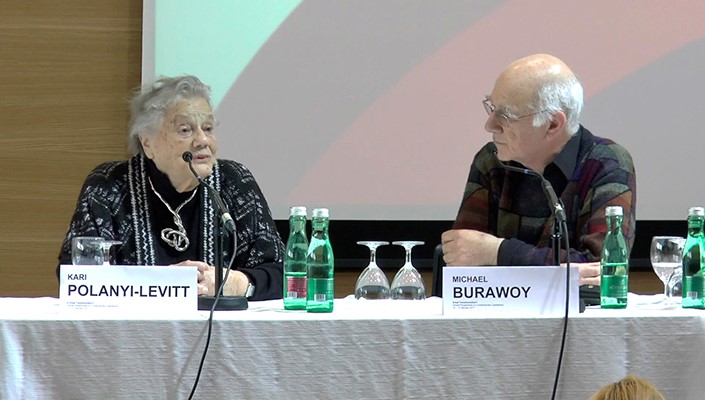
MB: So your father leaves Vienna in 1933.
KPL: Yes, he left Vienna because of the impending fascism. A decision was made by the editorial committee of the famous economic journal Der Österreichische Volkswirt, where he was then a leading editorial figure, that Polanyi should go to England because the political situation was tenuous. His English was excellent. He had contacts. So he went to England in 1933. He continued to contribute articles from England until the journal ceased publication in 1938. We didn’t go as a family. My father went in 1933. I was sent to England in 1934, and went to live with very close English friends, Donald and Irene Grant, whom we had known well in Vienna. They were Christian socialists working for the Student Christian Movement of Britain, handing out relief to impoverished postwar Austrians. And that is how we met them. And I lived with them. My mother came in 1936, two years later.
MB: Let’s go back to your father, now in England. What did he do there?
KPL: When he first arrived in 1933 he had no fixed employment. His support system there was Betty and John MacMurray and the Grant family who belonged to something called the Christian Left. They were Christian socialists. There were also communists and there were religious leaders, mostly Protestant. He wrote an important essay on the essence of fascism, which he considered to be an affront to Christian values, that would be included in a book he co-edited, Christianity and the Social Revolution. My father also led a study group of his English Christian friends, on the two volumes of Marx’s early writings, including The German Ideology and the famous Paris Manuscripts, which had just been published in 1932. He read to them from these writings, translating into English as he went along. He was very excited about these works. I remember the sense of his agreement with them. I call Marx’s early writings the common starting point of Marx and Polanyi.
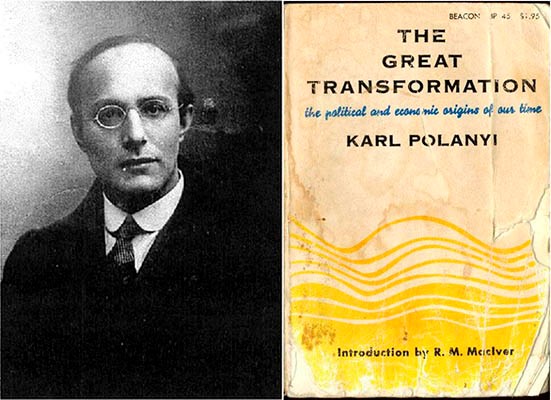
MB: He says as much in The Great Transformation. So what did his teaching involve? How did England influence his thinking?
KPL: It was not until 1937 that Karl obtained employment with the Workers Education Association (WEA), a very large and very old adult education movement. In England it is connected to Ruskin College that enables working-class people, who were not able to go to university, to obtain further education. My father got the chance to teach in English provincial towns in Kent and Sussex. He stayed overnight with the families. He got to know more intimately the life of working-class families, and he was shocked at the conditions he found and, to be honest, the low cultural level. By comparison with working-class people in Vienna they were culturally poorer, even though Austria was a far poorer country in monetary terms than Britain. The subject that he was required to teach was English social and economic history, about which he did not know anything. It was a period of self-study for him. If you look at the back of the book – The Great Transformation – you will see the enormous range of the studies he undertook. It is very similar to Marx’s Grundrisse that interestingly enough relies on similar authors – Ricardo, Malthus and others – writing on the early industrial revolution. So my mother wrote – and it is written in the foreword to the book called The Livelihood of Man, which was published posthumously – that it was in England that Karl put down the roots of a sacred hate of market society, which divested people of their humanity. That is how she put it. Then, of course, he discovered the class system in England. It consisted of differences of speech. And he described the class system as similar to caste in India, and race in the United States.
MB: In 1940 Karl Polanyi is invited to give lectures at Bennington College in the US.
KPL: Yes, in Bennington he received a two-year fellowship from the Rockefeller Foundation to write The Great Transformation. He had good support from the president of Bennington, but he had to report to the Rockefeller Foundation. Whatever he gave them to read, they did not like it. They had very serious doubts about his suitability to be in a university. They wrote that he really was more interested – and listen to this, as a put-down – in “Hungarian law, and college lecturing, and philosophy.” To say he was interested in philosophy is a total put-down. However, they renewed the grant. And at the end of the two years – we’re now in 1943 – my father was very keen to return to England. He did not want to stay in the United States. He wanted to participate in the postwar planning of England. By this time the Battle of Stalingrad had turned the tide of the war; it was very clear that the allies were going to win. And he left the two penultimate chapters of The Great Transformation unfinished. And if you look, those chapters have traces of being unfinished. Not the last chapter, but the two chapters before the last one. If he had stayed to finish the book, I think that the draft outline of a proposed book, “Common Man’s Masterplan” is really what he might have included in those last two chapters. Something of that. He left it with colleagues. There was a lot of contention and quarrel about these two penultimate chapters.
MB: But eventually he would return to the US to take a job at Columbia University, but your mother was prohibited from living in the US, so they ended up living in Canada.
KPL: The other option would have been to stay in England, where my father could have continued working for the WEA. But it was also clear that really, he had something to say. He had a book to write. And he had work to do. And he was not going to get any appointment at any university in England. That was very clear. So in 1947 came the offer from Columbia. It was based on The Great Transformation. The book had a foreword by Robert MacIver of Columbia University which is known in schools of economics for its institutionalism, and matched – in a sense – Polanyi’s approach. Then, in London, Ilona was told that she was prohibited from entering the United States. It was a big problem. My father was very, very upset. He wanted her to persuade the Americans to change their mind. And she said no way. That is not possible. So he conceived the idea that perhaps they might make a home in Canada, and eventually he persuaded her that this was a feasible solution. And she made a beautiful home for them on the outskirts of Toronto, in a rural setting – a tiny little house. And that was in 1950. He commuted like a student, from New York. He came for Christmas and Easter, and summer vacations. And when he finally retired from teaching in 1953 he spent more time in Canada. His students came to visit him constantly. And many other people came.
MB: And his research turned in a new direction. He became more interested in anthropological studies. But that I’m afraid is a story for another conversation. Thank you very much for this wonderful account of Karl Polanyi’s life. You have delved into the extraordinary prehistory of The Great Transformation. I think we now understand far better how it was the product of very different historical experiences in the twentieth century and why it remains so important today.
Michael Burawoy
Kari Polanyi Levitt

